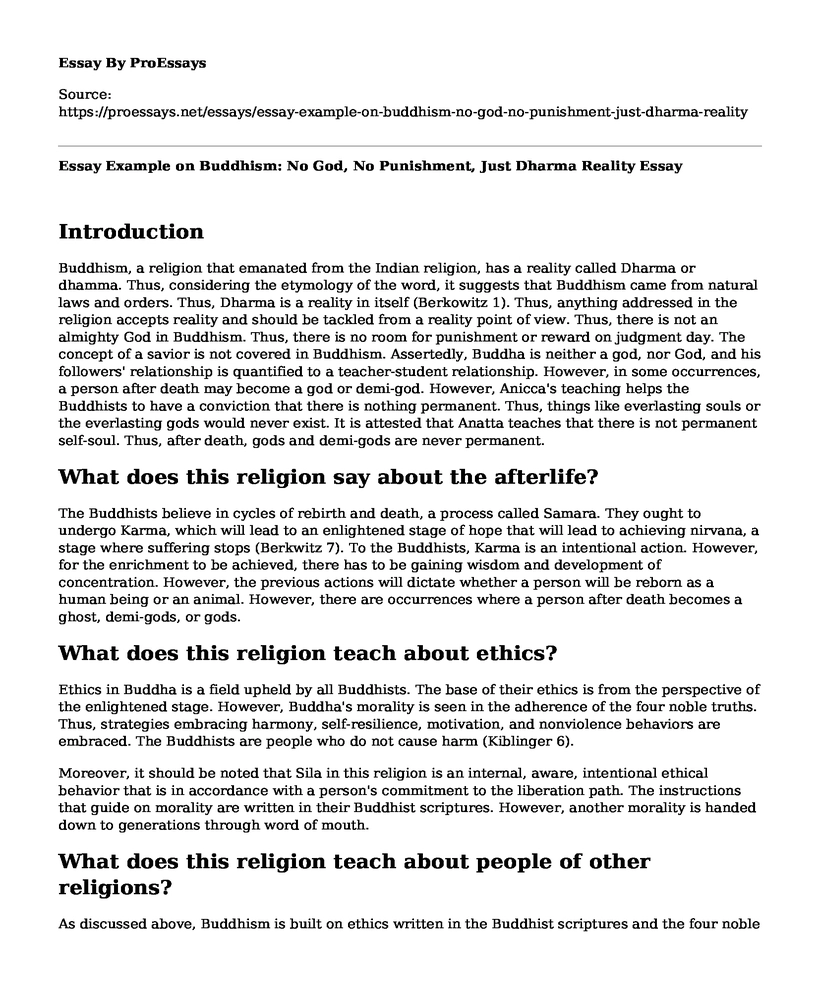Introduction
Buddhism, a religion that emanated from the Indian religion, has a reality called Dharma or dhamma. Thus, considering the etymology of the word, it suggests that Buddhism came from natural laws and orders. Thus, Dharma is a reality in itself (Berkowitz 1). Thus, anything addressed in the religion accepts reality and should be tackled from a reality point of view. Thus, there is not an almighty God in Buddhism. Thus, there is no room for punishment or reward on judgment day. The concept of a savior is not covered in Buddhism. Assertedly, Buddha is neither a god, nor God, and his followers' relationship is quantified to a teacher-student relationship. However, in some occurrences, a person after death may become a god or demi-god. However, Anicca's teaching helps the Buddhists to have a conviction that there is nothing permanent. Thus, things like everlasting souls or the everlasting gods would never exist. It is attested that Anatta teaches that there is not permanent self-soul. Thus, after death, gods and demi-gods are never permanent.
What does this religion say about the afterlife?
The Buddhists believe in cycles of rebirth and death, a process called Samara. They ought to undergo Karma, which will lead to an enlightened stage of hope that will lead to achieving nirvana, a stage where suffering stops (Berkwitz 7). To the Buddhists, Karma is an intentional action. However, for the enrichment to be achieved, there has to be gaining wisdom and development of concentration. However, the previous actions will dictate whether a person will be reborn as a human being or an animal. However, there are occurrences where a person after death becomes a ghost, demi-gods, or gods.
What does this religion teach about ethics?
Ethics in Buddha is a field upheld by all Buddhists. The base of their ethics is from the perspective of the enlightened stage. However, Buddha's morality is seen in the adherence of the four noble truths. Thus, strategies embracing harmony, self-resilience, motivation, and nonviolence behaviors are embraced. The Buddhists are people who do not cause harm (Kiblinger 6).
Moreover, it should be noted that Sila in this religion is an internal, aware, intentional ethical behavior that is in accordance with a person's commitment to the liberation path. The instructions that guide on morality are written in their Buddhist scriptures. However, another morality is handed down to generations through word of mouth.
What does this religion teach about people of other religions?
As discussed above, Buddhism is built on ethics written in the Buddhist scriptures and the four noble truth which embraces nonviolence and harmony. Moreover, religion accepts the real truth, which acts as its pillar. Thus it is true that the world has different religions, and thus the Buddhists must learn how to live harmoniously with them (Kiblinger 5). It is asserted that there is mutual respect between the Buddhist Masters and the leaders of other religions. Ascertainably, Dalai Lama frequently met Pope John Paul II. Moreover, in an invitation made by the pope in 1986 of all religious leaders in the world in Italy. Dalai was in-attendance and also made the first speech in the meeting.
Do females and males have similar or different roles in religious life?
There are different roles allocated to both females and males, but all the roles are to serve the same purpose. The male and females are both pertinent figures in the Buddhism religion. The roles in the religion are allocated to both females and males. Started by Buddha himself, Siddhartha Gautama had a female Buddha called Vajrayogini (Berkwitz 3). The two are essential in Buddhism. One can assert that the allocation of roles in Buddhism to females is to achieve equality. Thus, as asserted by studies, Buddhism is the most genderless religion in the world.
Works Cited
Berkwitz, Stephen C. "Textbook Buddhism: Introductory books on the Buddhist religion." Religion 46.2 (2016): 221-246.
Kiblinger, Kristin Beise. Buddhist inclusivism: Attitudes towards religious others. Routledge, 2017.
Cite this page
Essay Example on Buddhism: No God, No Punishment, Just Dharma Reality. (2023, Aug 30). Retrieved from https://proessays.net/essays/essay-example-on-buddhism-no-god-no-punishment-just-dharma-reality
If you are the original author of this essay and no longer wish to have it published on the ProEssays website, please click below to request its removal:
- The Challenge of Culture and its Impact on Faith/Spirituality and Social Justice: Expository Essay
- The Meaning of Christian Initiation Essay
- Dalai Lama View on Practice of Universal Compassion Essay
- Paper Example on Young Women's Christian Association: Symbolizing Body, Mind, Spirit Since 1855
- Historical Books of Israelites: Narrating the Past to Explain the Present - Essay Sample
- Essay on Leo Africanus: Exploring Islamic & Christian Relations in the Renaissance
- The Impact of Religious Convictions on the HIV Pandemic - Report Example







